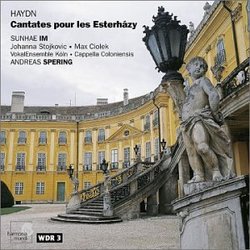| All Artists: Joseph Haydn, Andreas Spering, Cappella Coloniensis, Sunhae Im, Johanna Stojkovic, Max Ciolek, VokalEnsemble Koln Title: Haydn - Cantatas for the House of Esterhazy Members Wishing: 0 Total Copies: 0 Label: Harmonia Mundi (France) Release Date: 8/13/2002 Album Type: Import Genre: Classical Styles: Opera & Classical Vocal, Historical Periods, Classical (c.1770-1830), Symphonies Number of Discs: 1 SwapaCD Credits: 1 UPC: 794881670420 |
Search - Joseph Haydn, Andreas Spering, Cappella Coloniensis :: Haydn - Cantatas for the House of Esterhazy
 | Joseph Haydn, Andreas Spering, Cappella Coloniensis Haydn - Cantatas for the House of Esterhazy Genre: Classical |
Larger Image |
CD Details |
CD ReviewsStupendous doktorlehar | Columbia, MO USA | 05/19/2005 (5 out of 5 stars) "This is one of the most engaging, smile-enducing, spirit-lifting CDs of eighteenth-century music I have ever heard. It consists of three cantatas written by Haydn in the 1760s, during his tenure as composer-in-residence for the elite Esterhazy clan--the slipcase cover features a photo of their palace at Fertöd in western Hungary, where these pieces were first performed over two centuries ago. Two of the cantatas are structued as mini chamber operas, with arias, choruses and duets linked by short recitatives. The third is a simple aria with chorus, and to round the disc out we have get Haydn's lovely early Symphony No. 12. The texts flatter the Esterhazy princes in various ways ("Never may an insolent star shine in the heavens to harm you, but rather let that star shine which grants you its favor") and the music is generally upbeat and enthusastic. Perhaps this isn't Haydn's most original or profound music, but it may be his most infectuously tuneful and boisterous. Two of the cantatas receive their first recordings here and, the liner notes claim, their first performances since the eighteenth century. The forces used here are all first rate. The Capella Colonensis under Andreas Spering play with astonishing vigor and brio, but also elegance when necessary, and the soloists are all fine. One is better than fine: the young Korean soprano Sunhae Im sings like an angel and has the technique to handle the complex fioriture of Haydn's vocal writing. She gets the majority of the solo work and deserves the splotlight. For a sample, play her aria "Se ogni giorno" from the cantata "Qual dubbio omai," or even better the chorus that ends the first cantata, which is so sunny it will cause the buds to open on your houseplants. Very enthusastically recommended, especially for a rainy day." Premier recording, excellent! Christian V. Pampinella | Bloomington, IN | 11/05/2004 (4 out of 5 stars) "These recently discovered cantatas provide an excellent example of Haydn's highly dramatic operatic style. The music is quite idiomatic of Haydn's wit and creativity, and lovers of Mozart's operas would probably enjoy this very much. The performance is first rate, although not flawless - some of the coloratura is rather demanding and calls for extreme accuracy in the higher tessitura - it is all very precisely executed and lacks any 'early-music vocalist' ennui. Also, the obbligato keyboard in two of the cantatas is neat. This is the only recording of these works currently in the catalogue and I imagine they will quickly gain popularity. As a previous review mentioned, this recording is crammed with a sense of celebration and high-energy." Pleasant enough Siri Kirpal Kaur Khalsa | Eugene, OR United States | 03/03/2009 (4 out of 5 stars) "This CD features 3 cantatas Haydn composed for special occasions, plus Symphony 12. The first cantata is a little gem (never before recorded)and beautifully sung by the soloists. The chorus, however, is not precise enough to pull off Haydn's counterpoint with true brilliance. The chorus is fine in the second cantata, which is no masterpiece, but pleasant enough. The soloist for this one is very expressive. The third cantata is another Haydn gem. The main soloist isn't quite as good as she was in the first cantata, but still very good. The chorus is much better. The orchestra plays well throughout. In short, if you like discovering unsung works by great composers, you may enjoy this, but it is not brilliant throughout."
|
